Cancer is probably the most dreaded health problem for both humans and canines. Unfortunately, cancer is the leading cause of death among dogs above the age of 10. It causes physical suffering to the Bulldog as well as a financial and emotional toll on its owner. In this case, knowing what to do when your dog has cancer is crucial to give your dog the best quality of life.
No matter how healthy your Bulldog is, it can still develop cancer later in life. This is why you should be ready whatever happens. In this post, I talk about the common types of cancers in Bulldogs, what you need to do, and how to prevent them.
While this is just a general guide, it will give you a glimpse of this health condition. Read on to become a more knowledgeable Bulldog owner.
Common types of cancer in Bulldogs
Cancer is the abnormal growth of cells. If not cured and diagnosed right away, the cancer cells could spread all over the canine’s body. It’s a life-threatening condition and will become worse and untreatable as it progresses.
Just like any breed, Bulldogs can develop various types of cancer. The following are some of the most common:
Lymphoma
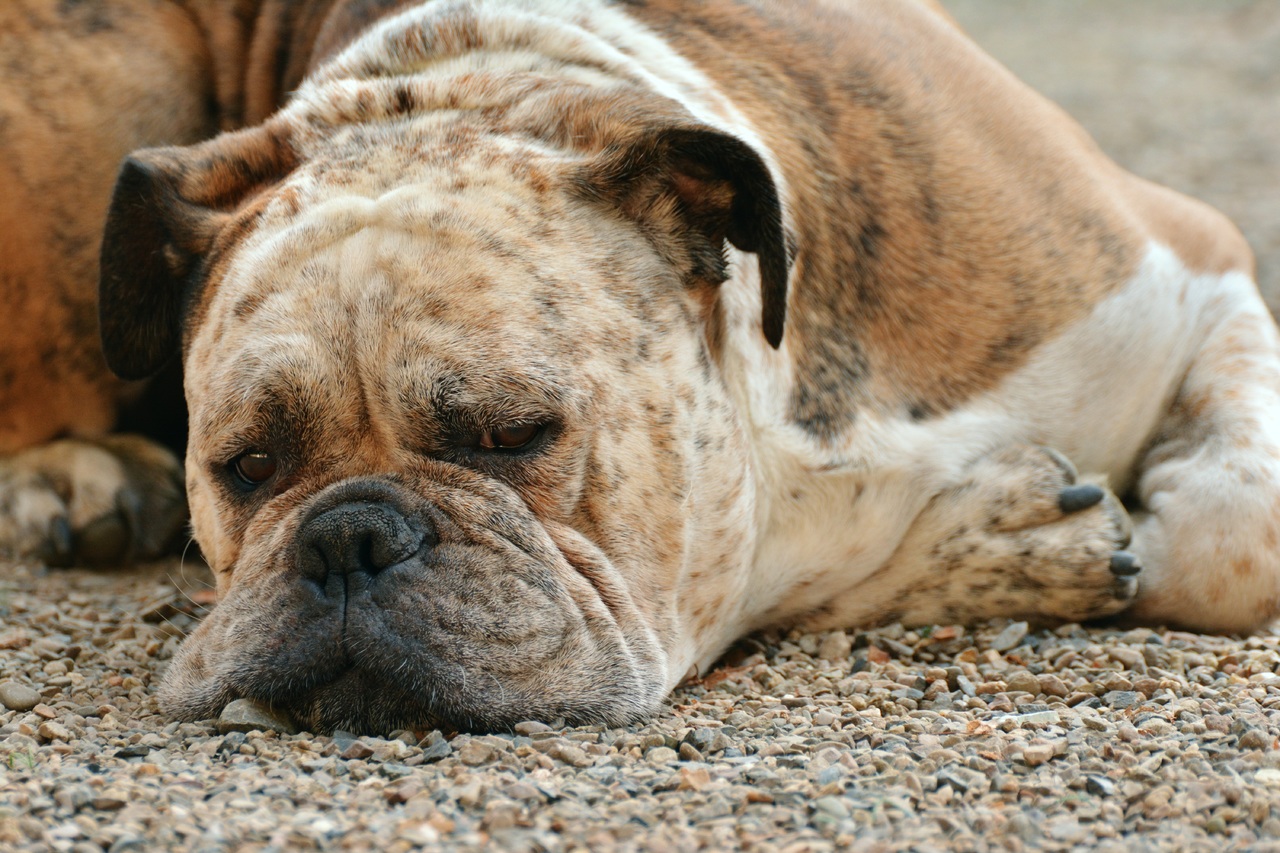
Lymphoma is a deadly type of cancer that could develop in dogs. Bulldogs, in particular, is one of the at-risk breeds for this condition.
This cancer is progressive and is caused by the abnormal growth of lymphocytes. It often starts on the bone marrow, lymphoid tissues, and lymph nodes. Still, it can occur outside the lymphatic system, like in the central nervous system or skin.
Basically, lymphoma is classified into three types based on where it’s located in the body. These are multicentric, alimentary, and mediastinal.
- Multicentric. Bulldogs with multicentric lymphoma will suffer from rapid but non-painful enlargement of their lymph nodes. This is the most common type of lymphoma, which will cause the nodes to grow up to 10 times their original size. From the lymph nodes, it will soon move to various internal organs of the Bulldog.
- Alimentary. This type is uncommon and is only observed in 10% of Bulldogs with lymphoma. It manifests as stomach upset at first as cancer affects the digestive system. You’ll notice your Bulldog vomiting, having diarrhea, and losing weight due to poor digestion.
- Mediastinal. Like the alimentary type, mediastinal lymphoma is also uncommon. Bulldogs with this type often exhibit enlarged lymph nodes, thymus, or even both. As the tumor gets bigger, it will put pressure on the lungs and block the blood flow into the heart.
Mast cell tumors (MCT)
Another common type of cancer in Bulldogs is mast cell tumors. This cancer targets the mast cells, which are responsible for allergies. And as we know, Bulldogs are quite notorious for their bad case of allergies and other sensitivities.
Overall, MCT is the cause for over 20% of all cases of skin tumors among canines. It usually occurs on the skin level as a lump, but it can also manifest on other parts of the Bulldog’s body.
Hemangiosarcoma
Hemangiosarcoma is an incurable and aggressive form of cancer. This is often observed on the middle to old-aged dogs, though younger ones aren’t fully invincible to this deadly condition.
With this cancer, the tumors grow on the cells that line the canine’s blood vessels. Unlike lymphoma, hemangiosarcoma develops gradually and won’t cause pain until it’s already in the advanced stage.
Since this cancer doesn’t exhibit immediate symptoms, most Bulldogs will be diagnosed once the tumors are already resistant to modern treatments. Based on current numbers, only less than half of affected canines will survive beyond the six-month period.
Bladder cancer
Canine bladder cancer is often due to transitional cell carcinoma. The tumors grow on the cells lining the canine’s urinary bladder. Over time, the tumors will spread all over the canine’s organs, bones, and lymph nodes.
If your Bulldog gets a recurrent urinary infection, bloody urine, increased urination, and incontinence, you should get it checked.
If diagnosed early, bladder cancer can be treated through surgical procedures.
Brain tumor
Like us, Bulldogs can also develop brain tumors. Since it’s located in one of the most sensitive body organs, brain tumors can be challenging to treat. The consolation is that brain tumor often manifests symptoms early enough for the canine to be diagnosed.
Bulldogs with brain tumors will have a wobbly gait, abnormal vision, weird behavior, and hypersensitivity to various stimuli.
It’s quite unknown what causes a brain tumor, but factors like genetics, diet, immune system, and trauma are all at play here.
Mammary carcinoma
Lastly, Bulldogs can also develop mammary carcinoma. It’s more common in female dogs, but there are cases when male Bulldogs also get affected.
In this condition, a tumor grows in the mammary tissues. It often occurs on unspayed dogs or those that’s been fixed after the first heat cycle. Mammary carcinoma is more common among toy and small breeds, but Bulldogs aren’t immune to it.
An affected Bulldog will have a lump near or around its breasts. The tumors can also bleed and become ulcerated, which makes them more visible.
These are just some of the potential cancer types that could affect Bulldogs. Your pet can develop other conditions, so it’s important to be on top of regular vet checks.
What to do when your dog has cancer?
The big question is this: what are you going to do if your Bulldog is diagnosed with one of these cancer types? While the diagnosis can cause disbelief, you need to process it for your pet. Here are some of the steps you need to take:
✔️Learn more about your Bulldog’s cancer
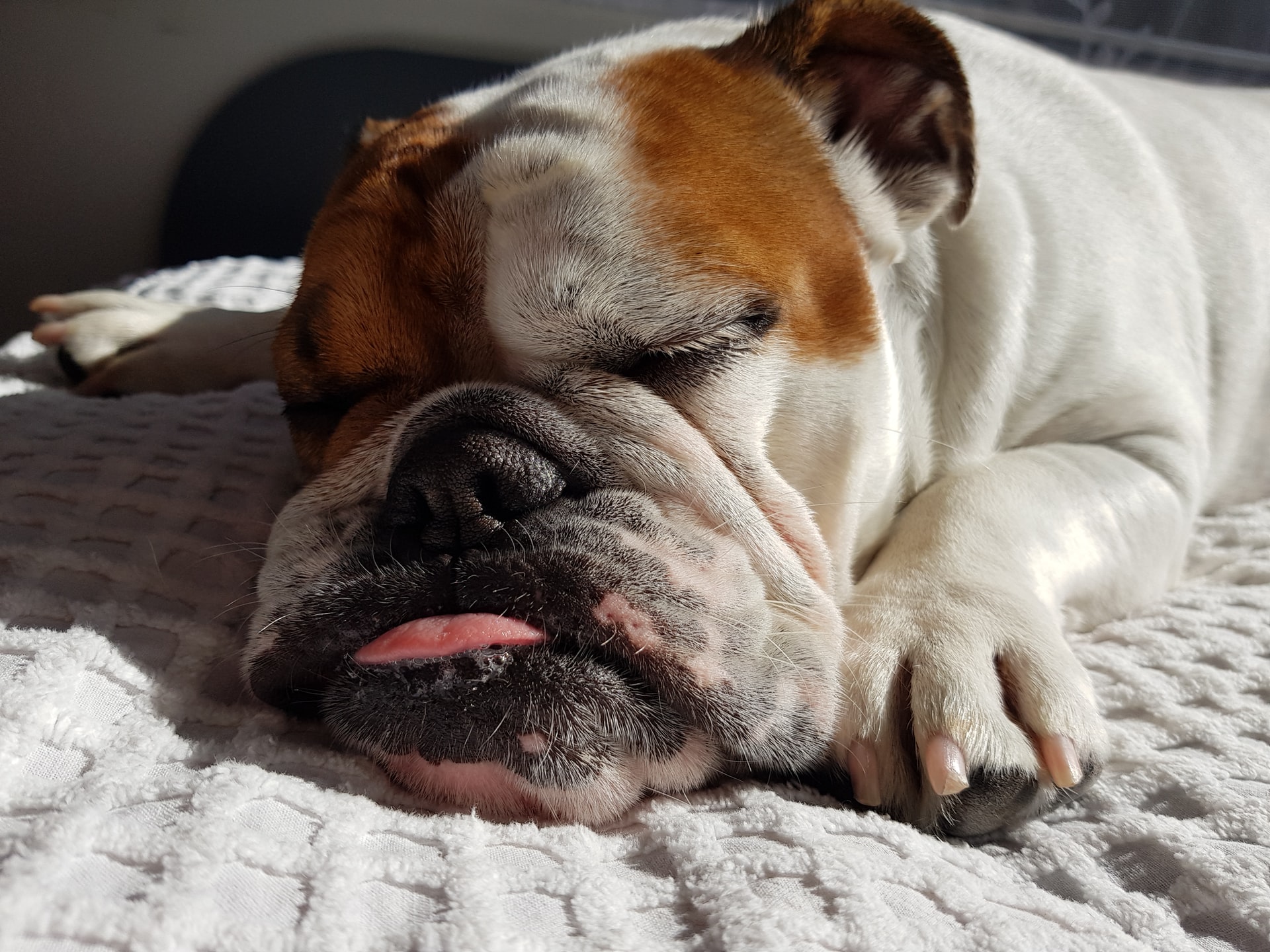
Upon receiving the diagnosis, the first thing you should do is know more about your Bulldog’s condition. Ask about what type it is and where it’s occurring in your canine’s body.
Don’t hesitate to ask the vet to explain to you terms like ‘metastasize’, ‘neoplasia’, and so on. This will put you in the same boat as the vet since treatments and further tests are filled with this medical jargon.
It’s important to come to terms that cancer is common among canines across breeds. It also occurs in different types, varying progression, and to different extents. Some cancers spread faster while others are slower. Also, not all cancers show immediate symptoms. The deadliest often spread in the dog’s body without initial signs.
✔️Don’t hesitate to look for another opinion.
Similar to human diagnosis, it doesn’t hurt to bring your dog to another veterinarian or expert. This is so your Bulldog will be re-examined to confirm the presence of cancer. Many vets will refer their clients to experts if they suspect that the animal is suffering from abnormal cellular growth.
Accurate diagnosis is crucial, especially for conditions as complicated as cancer. It’s not enough that the veterinarian knows there’s malignant growth. He or she should be able to point out where the cancer is, how it’s spreading, and how it affects your pet.
✔️Explore treatment options
Once you have an in-depth knowledge of your Bulldog’s condition, the next step is to explore treatment options. Cancer is a broad and complicated health condition. It requires different treatments based on the Bulldog’s actual condition, the severity of cancer, and the pet owner’s decision.
The following are some of the most common approaches used to treat canine cancer:
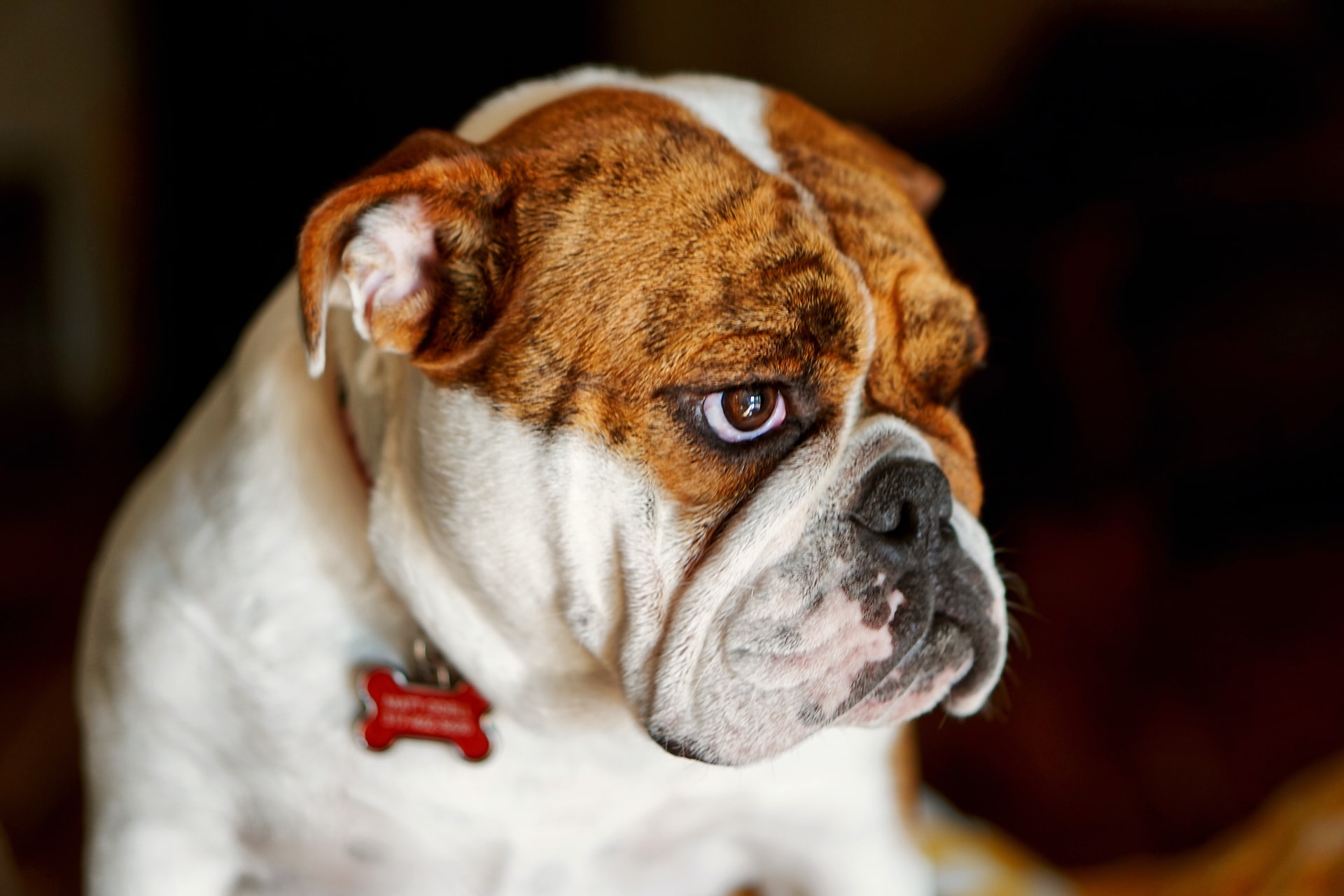
Chemotherapy
Humans aren’t the only ones who undergo chemotherapy. Bulldogs diagnosed with cancer can also receive this treatment. Chemo is often the best option if cancer has already spread in the body or is likely to spread fast.
Unlike chemotherapy in humans, those for dogs are less aggressive. This is because the goal of chemo in dogs is to improve the canine’s quality of life for as long as possible. A cure isn’t always the ultimate goal. Nevertheless, there’s hope for a total cure, but most vet oncologists will prioritize the quality of life over life-at-all-cost.
Radiation therapy
With this treatment, small doses of radiation are delivered to the cancerous tumor to destroy it. Unlike chemotherapy, radiation therapy doesn’t use a concoction of drugs. It also has fewer side effects in most cases.
By damaging the cancer cell’s DNA, it will not have the chance to spread throughout the canine’s body. This treatment will help shrink or totally remove the presence of a tumor.
Like chemotherapy, radiation therapy will require multiple sessions. The good thing is that it’s done under general anesthesia, so your Bulldog won’t feel any pain.
Surgery
If your Bulldog’s cancer is still in its infancy, the vet can perform curative surgery. During this procedure, the cancerous tumor will be removed to stop its spread. However, such removal can either be partial or full, depending on the canine’s condition.
Take note that the efficacy of surgical tumor removal depends on the type of tumor, how early it’s diagnosed, and the technique used.
Aside from these three methods, veterinarians and pet oncologists can perform other treatments. Herbal or holistic therapies are also possible if your Bulldog doesn’t thrive in a drug-based approach.
✔️Revisit your pet’s insurance policy
If your Bulldog has insurance, you should revisit the policy to see if it covers specific cancer your pet has. Most comprehensive pet insurance policies will cover at least a few types of cancer. If your Bulldog has been covered at an early age, there’s a high chance that coverage is more comprehensive.
Take note that pet insurance can save you from financial turmoil since cancer treatment is expensive. While you will still shell out a specific amount, it’s just a small portion of the total vet bill.
If your Bulldog doesn’t have this policy, you can start crowdfunding drives to cover the cost. Pet foundations can also help in paying off a portion of your dog’s medical care.
✔️Consider looking for a veterinary oncologist.
If you want the best possible care for your Bulldog with cancer, you should consider going to a veterinary oncologist. This expert treats cancers in animals.
A veterinary oncologist will help diagnose your Bulldog’s cancer type even better. The oncologist can also discuss the treatment options available.
✔️Consider your dog’s quality of life.
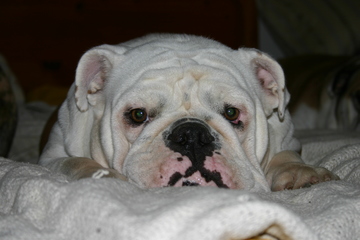
Unlike cancer treatment in humans, those for dogs focus on alleviating suffering. Therefore, it’s crucial to consider your Bulldog’s quality of life in choosing the treatment option that’s best for him.
If your Bulldog is in more pain than comfort during chemotherapy, it may not be worth the hassle. Cancer treatments in dogs are less aggressive since it’s intended to save the pooch from pain.
If all potential treatments cause agonizing pain on your Bulldog, you may want to consider euthanasia. This is something your dog’s vet will also discuss with you.
In the end, you have to stay strong for your Bulldog, but you should also be realistic.
Should I put my dog down if he has cancer?
Whenever a dog is diagnosed with cancer, euthanasia is commonly, if not always, at the back of the owner’s mind. Cancer is life-threatening, and treating it is an excruciatingly painful process for the canine.
If all treatments aren’t feasible or practical, putting the dog down might be the most humane and selfless thing you can do for your Bulldog.
But the question is this: how do you know if it’s the right time? The truth is that there’s no specific list of conditions or criteria to when a canine should be euthanized. It’s often decided after a sincere and in-depth discussion with the dog’s vet.
It’s not easy to decide to end your beloved Bulldog’s life. However, experts say that if a canine already has an incurable form of cancer or unbearable and lingering pain, euthanasia might be the best option.
There’s no perfect time or reason when to put your Bulldog to sleep. But if the cancer is no longer making good quality of life possible, your dog will thank you for making the big decision. Your dog’s vet will play a big role in helping you decide.
The cost of treating cancer in Bulldogs
The cost of cancer treatments in canines varies widely. But whatever the dog breed and cancer type are, veterinary care will surely be expensive.
In general, chemotherapy for dogs will set you back at around $200 to $5,000. This depends on the severity of your dog’s condition as well as the clinic where you took your dog.
Meanwhile, radiation therapy may cost around $2,000 to $6,000. This is aside from tests and additional treatments like antibiotics or pain killers that the vet will prescribe.
This is why many dog owners are often left with the burden of collecting funds to cover all the expenses. It’s also the same reason why you should get your Bulldog a pet insurance policy. While your dog looks healthy now, it’s still best to be prepared.
Most of the time, cancer treatments for Bulldogs get more expensive the longer it takes to be diagnosed. This is why you should bring your dog to the vet whenever it shows unusual and worrisome symptoms.
How to prevent cancer in Bulldogs
Canine cancer is somewhat preventable. You can reduce your Bulldog’s risk by following these tips:
✔️Get your Bulldog spayed/neutered.
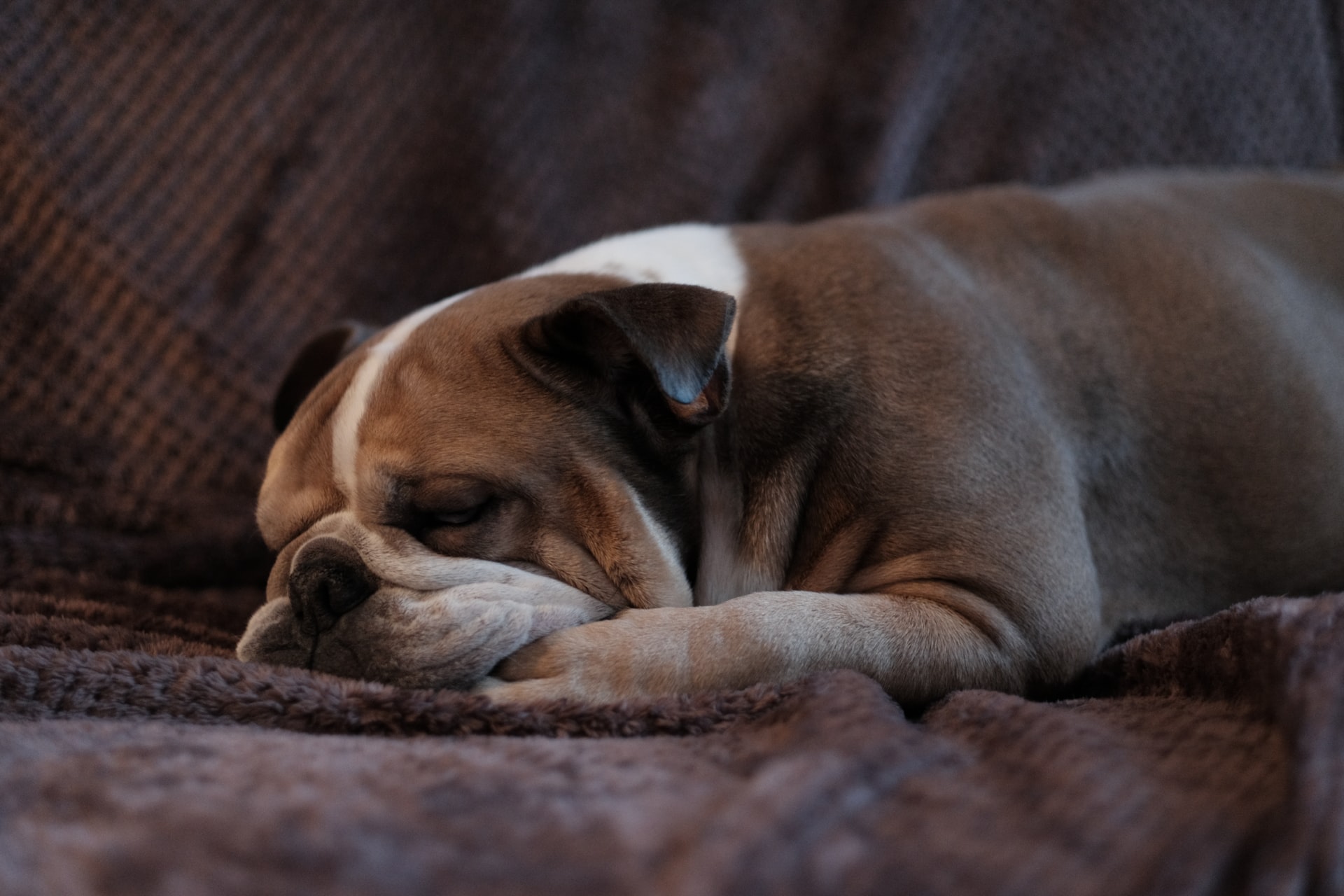
Getting your Bulldog spayed or neutered will directly reduce its risk of having mammary cancer, especially in females. For male canines, neutering will reduce or even eliminate the risk of testicular cancer since their testicles will be removed.
It’s important to get a female Bulldog spayed before its first heat cycle. You can talk to your dog’s vet about the best time. Usually, it falls within the first 6 to 18 months of the canine’s life.
✔️Avoid canine obesity
Due to their voracious appetite, Bulldogs can easily gain excessive weight. This is something you need to avoid if you want to reduce your pet’s risk of cancer.
Obesity and excessive weight slow down your dog’s metabolism. It also increases the canine’s inflammatory responses, which could fuel the potential growth of cancerous cells.
✔️Reduce sun exposure
Bulldogs have a thinner coat than other breeds, which makes their skin prone to sun damage. If your Bulldog keeps on basking under ultraviolet rays, mast cell tumors may form.
It’s best to keep your doggo in a shaded area at all times. Besides, Bulldogs can’t tolerate too much heat since they are brachycephalic canines.
If you’re taking your doggo for a walk, schedule it early in the morning or late in the afternoon. This way, you can avoid peak sun hours.
✔️Stick to a healthy diet
A healthy diet is crucial in keeping a healthy Bulldog. It’s best to ask the vet about the best diet for your pet based on its overall health condition.
Moreover, you should avoid extremely cheap kibble. While it’s still delicious for your dog, these dirt-cheap products may contain carcinogens that will put your pet’s life at risk.
As a responsible paw-rent, you have to be meticulous with what you’re feeding your dog.
✔️Observe proper grooming
Through proper grooming, you can spot lumps and abnormal growth right away. This will pave the way for early diagnosis and treatment. In the long run, it will save your Bulldog from pain and suffering.
Aside from that, proper grooming will prevent the proliferation of pathogens that increase your pet’s risk of infection.
Specifically, you shouldn’t forget to take care of your Bulldog’s oral hygiene. Oral cancer is prevalent among dogs, but it’s preventable through proper dental care.
✔️Invest in regular vet visits
Lastly, you should never skip vet visits. You should take your dog to the vet regularly for checkups. This is regardless of whether your Bulldog looks like in the best shape. Remember that some of the most aggressive cancers spread quietly without obvious symptoms.
A wellness examination can help identify potential health problems on your Bulldog before it becomes worse. While the checkup will cost a fee, it’s better than paying for late-stage cancer treatments.
Frequently Asked Questions
Q: Is a dog with cancer in pain?
A: Cancer is often a painful and excruciating health problem. The worst part is that the pain can be gradual and lingering, which will cause more suffering for the canine. It’s important to take care of your Bulldog to reduce the pain and give it the best quality of life possible.
Q: Do dogs suffer when they have cancer?
A: Bulldogs with cancer will suffer from stress, pain, and physical exhaustion. It’s almost impossible to treat canine cancer without subjecting the pooch to major distress. Still, cancer doesn’t mean your Bulldog won’t go back to its normal life. Many dogs who received successful treatment can go back to their usual routines.
Q: Is it worth giving dog chemotherapy?
A: Many cancer types are still curable among dogs. Chemotherapy is often the most effective way to treat the condition. However, the process will be physically taxing to the canine and will cause substantial pain. Most vets will recommend chemotherapy to Bulldogs dealing with any kind of cancer.
Q: What is the most aggressive cancer in dogs?
A: Of all types of cancer in dogs, hemangiosarcoma is one of the most aggressive. It can spread on the dog’s body rapidly, where it will produce tumors. In dogs, this cancer often occurs in the spleen and heart, though it can also spread to other parts of the body.
Q: What food causes cancer in dogs?
A: Aflatoxins are the most common carcinogens found in dog food products. These toxins get into the food because of manufacturer negligence. To avoid exposing your dog to this carcinogen, you should invest in high-quality and nutritious food.
Final words
Knowing what to do when your dog has cancer will prepare you for the worst. Cancer is common among canines, so it’s important to stay educated. If ever your Bulldog got diagnosed with this condition, there are many treatment options you can consider. Your dog’s veterinarian will work out the best approach based on your pet’s well-being.
Do you have something to add here? Share your thoughts below!

